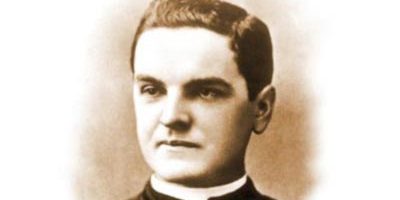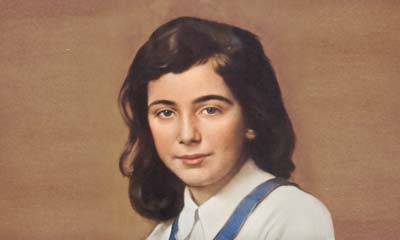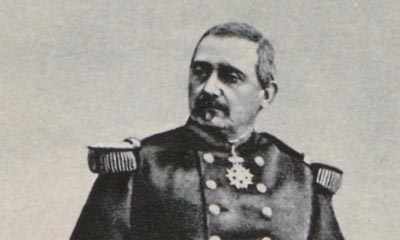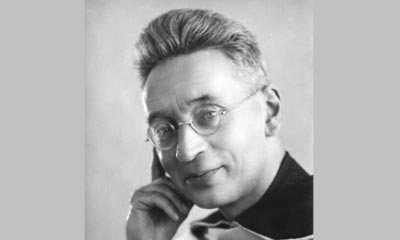February 15, 2023
Blessed Michael McGivney
Dear Friends,
“In the present circumstances, it is quite necessary that, in the area of lay activity, the united and organized form of the apostolate be strengthened. In fact, only the pooling of resources is capable of fully achieving all the aims of the modern apostolate and firmly protecting its interests. Here it is important that the apostolate encompass even the common attitudes and social conditions of those for whom it is designed. Otherwise those engaged in the apostolate are often unable to bear up under the pressure of public opinion or of social institutions” (Vatican II, Decree Apostolicam Actuositatem, November 18, 1965, no. 18). This kind of apostolate has been carried out since the 19th century by the Knights of Columbus, whose founder was Blessed Michael McGivney.
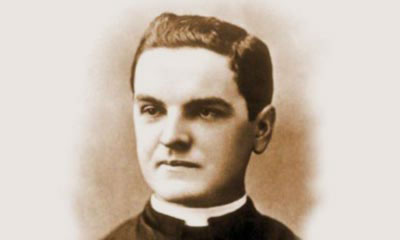 Michael Joseph McGivney was born on August 12, 1852, in Waterbury, Connecticut, in the northeastern United States; his parents, Patrick and Mary, were both Catholic Irish immigrants. Like so many other Irish citizens, they had been forced to flee their home country when it was hit by a devastating famine between 1848 and 1852: almost 20 percent of the population perished, and as many emigrated, mainly to the United States and Canada. However rich, these countries were not capable of absorbing this massive influx of immigrants in a short time, and many were reduced to extreme poverty. In the United States, a predominantly Protestant country, Catholic immigrant families frequently faced prejudice and social exclusion. The Irish often had no choice but to take up the most dangerous jobs in the mines, railways and factories. Accidents, illness and overexertion were common causes of premature death among working fathers, who left behind their widows and children in misery.
Michael Joseph McGivney was born on August 12, 1852, in Waterbury, Connecticut, in the northeastern United States; his parents, Patrick and Mary, were both Catholic Irish immigrants. Like so many other Irish citizens, they had been forced to flee their home country when it was hit by a devastating famine between 1848 and 1852: almost 20 percent of the population perished, and as many emigrated, mainly to the United States and Canada. However rich, these countries were not capable of absorbing this massive influx of immigrants in a short time, and many were reduced to extreme poverty. In the United States, a predominantly Protestant country, Catholic immigrant families frequently faced prejudice and social exclusion. The Irish often had no choice but to take up the most dangerous jobs in the mines, railways and factories. Accidents, illness and overexertion were common causes of premature death among working fathers, who left behind their widows and children in misery.
A need for priests
Michael was the eldest of thirteen children, six of whom died in infancy. At home and in church, Michael learned to pray and to place God’s love above all else. He was a good student at Waterbury Public School and was noted for his excellence, even skipping several grades, and he completed his schooling three years ahead of schedule. At the early age of thirteen, he began work in a brass factory in order to help support his family.
Because the Catholic population was growing faster than the clergy, there was a great need for priests. Michael, who understood this, decided to become a priest despite his father’s opposition, with the encouragement of his parish priest. Catholic seminaries were few and far between in the United States at the time, and the number of available places was limited. The Civil War (1861-1865) was raging, and with it had come waves of hatred. In recent years, a number of Protestant sects and secret societies had stirred up opposition to Catholicism; bishops and seminary directors had begun to select candidates for the priesthood after strict criteria, so as not to give rise to slander and opposition. In 1868, having at last received his father’s blessing, Michael entered the seminary at Saint-Hyacinthe, Quebec, in Canada. Having studied there for two years, he took a year’s break, after which he continued his education at Our Lady of the Angels Seminary in New York State (1871-1872). Sports played an important role in the seminary, and Michael proved to be an excellent baseball player. Subsequently, he returned to Quebec, to the Jesuit College of Sainte-Marie.
When his father died in June 1873, the young seminarian, being the eldest of the family, had to return home to provide for the education of the younger ones. However, the elder girls in the family soon found paid jobs and thus saved him from having to return to work in the factory. Moreover, the Bishop of Hartfort, who considered him to be one of his finest seminarians, granted him a diocesan scholarship. By September 1873, Michael was able to resume his theological studies at St. Mary’s Seminary in Baltimore, run by the Sulpicians. “In their company, he unfolded his mind,” noted one of his biographers. “They taught him to regard scholarship as merely a subsidiary quality in a priest… Sympathy for human woes was a property more intrinsic than knowledge… To store up knowledge was good, they admitted; but to save souls was incomparably better.”
Michael stayed at St. Mary’s for four years. Having received such a lengthy and thorough training, the young man, who was perceived by those closest to him as quiet, determined and pious, but blessed also with a good sense of humor, was perfectly equipped to become a secular priest. He was ordained to the priesthood on December 22, 1877. A few days later, in the presence of his mother, Father Michael Joseph McGivney celebrated his first public Mass at the Church of the Immaculate Conception in Waterbury. He was twenty-five years old. He began his newly-appointed ministry on Christmas Day as a vicar at St. Mary’s Parish that had been founded in 1870 in Newhaven, a seaport on the Atlantic coast of Connecticut. The parish priest, Father Patrick Murphy, was also the son of an Irish immigrant. Father Murphy was a prominent figure among the clergy of the diocese thanks to his outstanding ecclesiastical studies. Despite many difficulties, he had succeeded in completing the construction of the parish church, which was dedicated in 1874, and later, that of the rectory. Father Murphy managed to pay off the debts incurred to bring these projects to completion, but he lost his health in the process: aged thirty-two, he looked like an old man. It was for this reason that the diocesan bishop found it necessary to appoint a vicar by his side.
A “blemished avenue”
Industrial development was booming in the city of Newhaven. Maritime transport provided it with a large part of its resources. Yale University, one of the most famous colleges in America, was based there. Catholic, Protestant and Jewish communities lived side by side in harmony; however, there was some hostility towards Catholics. The New York Times headlined an article about Father Murphy’s church: “How an Aristocratic Avenue was Blemished by a Roman Church Edifice.” Against this backdrop, Father McGivney skillfully handled relations with the Protestants, always striving to avoid conflict.
The younger priest’s preaching was much appreciated. In addition to his perfect diction, his face, pale and serene, impressed his listeners with its gentle strength; it made manifest both the justice and the mercy of God. Many witnesses recalled before all else the young priest’s determination and indomitable character; yet he was never gloomy, and had a real talent for making an entire assembly laugh. People were naturally drawn to his reserved but welcoming demeanour, and even some non-Catholics came to the church to hear him preach. He played a decisive role in several conversions. Two groups of parishioners became particularly attached to him. Firstly, the children, to whom he was very gracious. “I never found him boring,” one of them later recalled. His catechism classes were very carefully prepared, and he frequently called on one or other of the pupils to play a biblical character. The second group was that of the teenagers. In this parish, as in many others, many of them dropped religious practice. The first reason for this was that they were bored in church because no one showed enough interest in them; another was alcoholism and sexual lust, of which they became slaves. Father McGivney took it to heart to take care of them, and to make them know and love Jesus Christ.
Opposition to secret societies
Although his primary concern was the faith of his congregation, Father McGivney kept a close eye on family, social, financial and civic issues affecting Newhaven’s largely African-American and Catholic immigrant population. There was no shortage of good works, and the vicar eagerly took part in them, including the annual parish fair, the fairs of other parishes in the city, and the celebration of the feast of St. Patrick, the patron saint of Ireland from which most Catholics in the city originated. He also encountered parish leagues for total abstinence from alcohol. The one in his parish decided to put on plays for the benefit of its members and to help raise modest funds. Father McGivney joined the initiative and agreed to be a member of the board, but refused the presidency, which he left to a layman. On the other hand, he did not hesitate to act as an advocate for his parishioners in court, in order to safeguard the integrity of their families; he also offered his cordial cooperation to the ministers of other Christian denominations in the organisation of various good works.
In response to a certain sense of emptiness experienced by men in the context of the time, secret societies were proliferating. Under pretense of solving the social problem, these spread ideologies that are incompatible with faith and morals. Father McGivney soon found himself fighting against them. He prevented their members from taking part in services with their insignia, especially at funerals, and strove to turn his own faithful away from them. At the same time, certain disorders in the parish required him to exercise his firmness of character, even to the point of severity.
In July 1878, Father Murphy, who was stricken with pulmonary tuberculosis, was compelled to leave the city, as summers are extremely hot on the Atlantic coast. He entrusted the parish to his vicar. Two years later, God called Father Murphy to eternal life. Father Patrick Lawlor, Father Michael’s brother-in-law, succeeded him at the head of the parish. It was at this time that Father Michael brought together Newhaven’s leading Catholic men in the basement of St. Mary’s Church. There, they planned to found a Catholic fraternal relief society whose aim was to help men preserve and strengthen their faith, but also to provide financial support to families who had lost their father. The priest clearly understood that in order for families to remain together, they needed both material and spiritual support, for without financial means, families were often forced to separate, a situation that was not without great peril for the faith of their members. In October 1881, at a meeting attended by eighty men, a committee was set up, headed by James T. Mullen who was tasked with drafting the statutes of an association in which mutual assistance was to be the dominant feature.
A new chivalry
A tragedy similar to the one that had caused Michael to interrupt his priestly studies speeded up the project. Following the death of its head and father, the Downes family, of Irish descent, experienced serious financial difficulties. In January 1882, the municipal court judge found himself under the legal obligation to take the children away from their mother and place them under public care. The only way to avoid this was for a voluntary guardian to come forward and pay a large deposit. To everyone’s surprise, the vicar presented himself to fulfill this role, and one of his friends, a grocer, paid the deposit. On the following March 29, the “Knights of Columbus” were founded. In a letter to his fellow priests of the diocese, Father McGivney explained that his first objective in founding the Knights was “to prevent people from joining secret societies;” to this end, he would offer them the same or even better benefits than they would have received there. His second aim was to unite the Catholics of the Hartford diocese, “that we may thereby gain strength to aid each other in time of sickness; to provide for decent burial, and to render pecuniary assistance to the families of the deceased members.” Father Michael went on to ask his confreres to cooperate in setting up a council of Knights in each parish.
By naming the members of the new association “Knights of Columbus,” Father McGivney was in fact referring to the deep roots of Catholics in America. The State of Connecticut granted the Knights official recognition as a legal association. The first Knights elected Father McGivney as their leader, but the humble priest declared that a layman ought to lead this organisation of lay faithful. James T. Mullen was elected as the first Supreme Knight, and Father McGivney accepted the position of Supreme Secretary; he resigned two years later in order to be appointed Supreme Chaplain, believing that his first obligation was to serve the Order as a priest. A women’s branch of the Knights would soon give women the opportunity to collaborate in this work. Later, a branch for young people was founded: the “Columbian Squires.”
The main concern of the Knights was to protect the faith of Catholics. This led them to promote the full recognition of their rights as American citizens. So doing, they hoped to reduce social pressure aimed at making them abandon their faith. Keeping the faith is not just a matter of knowing the catechism, important as that may be, but also of putting into practice the great commandment of Jesus: to love God above all else, and one’s neighbor as oneself for God’s sake. In the parable of the Good Samaritan (Lk. 10:30), Jesus teaches that love of neighbor must be shown in the streets and on the roads, reaching out to those living on the margins of society, healing the wounds of the sick, and providing for their needs. The Knights were led to address many of the challenges facing the lives of Catholic families. The publications of the association have always supported the integral Catholic doctrine. Today, they strongly defend life and oppose abortion; they champion the family by rejecting same-sex “marriage.” In their early days, however, the Knights faced a number of difficulties: they were met with much criticism, especially from priests. In the spring of 1883, men from a nearby town, Meriden, asked to join the Knights. This gave a great impetus to the Newhaven group and the work of the Knights began to flourish.
Pleasing God rather than men
The Second Vatican Council would later emphasize the role of the laity in society: “Impelled by divine charity, they do good to all men, especially to those of the household of the faith, laying aside ‘all malice and all deceit and pretense, and envy, and all slander’ (1 Peter 2:1), and thereby they draw men to Christ. This charity of God, ‘which is poured forth in our hearts by the Holy Spirit who has been given to us’ (Rom. 5:5), enables the laity really to express the spirit of the beatitudes in their lives. Following Jesus in His poverty, they are neither depressed by the lack of temporal goods nor inflated by their abundance; imitating Christ in His humility, they have no obsession for empty honors but seek to please God rather than men, ever ready to leave all things for Christ’s sake and to suffer persecution for justice sake, as they remember the words of the Lord, ‘If anyone wishes to come after me, let him deny himself and take up his cross and follow me’ (Matt. 16:24). Promoting Christian friendship among themselves, they help one another in every need whatsoever” (Decree Apostolicam actuositatem, no. 4).
Besides his parish ministry, Father Michael was called upon to assist a man on death row, James Chip Smith, a 21-year-old Catholic who had killed a police officer under the influence of alcohol. The priest visited him every day for many months. The change in the young man’s attitude was so striking that the local newspapers reported on it. A few days before his death, James Smith said to his mother, who was in tears: “Don’t cry, Mom! I shall soon be in a much better place. Imagine if I had died on the night of the fight. I would have died without being able to prepare for death, and it would have been much worse.” On the day of the execution, standing at the foot of the gallows, Father Michael read prayers that the young man repeated after him. He was deeply affected by this tragic death. In recognition of his kindness, Jacques bequeathed him the plant that had bloomed in his cell.
In the fall of 1884, after seven long years of ministry at St. Mary’s parish, Father McGivney—to the deep sorrow of the parishioners of Newhaven—was appointed parish priest of St. Thomas in Thomaston, a town with a thriving watch industry. “Never, it seemed,” a journalist commented at the time, “was a congregation so affected by the parting address of a clergyman as the great audience which filled St. Mary’s yesterday.”
Father Michael would soon be given the additional charge of the parish of Terryville, a modest town five kilometers outside Thomaston. During his six years at St. Thomas, he developed a strong bond with his parishioners, while remaining Supreme Chaplain of the Knights of Columbus. Well aware of the rectitude of the Order’s leaders in Newhaven, he watched over their reputation from his new rectory and published articles in local newspapers defending them from slander and misconceptions, such as likening the Knights to a secret society. In 1888, a vicar was appointed to the parish, allowing Father McGivney time to work towards the further development of the Knights. A group of men applied for the foundation of the first chapter outside Connecticut (where more than forty such chapters already existed), in Providence, Rhode Island. Father Michael travelled there several times.
Two million members
In 1889, Father McGivney’s health began to fail, even though he was only thirty-seven years old. Exhausted and weakened by his pastoral work, he caught the flu in December, which worsened into pneumonia the following month. Despite several rest-cures and consulting with specialists, his condition did not improve. Tuberculosis claimed his life on the morning of August 14, 1890, two days after his thirty-eighth birthday. The Knights of Columbus had six thousand members at the time. Nearly all of the fifty-seven existing Knights of Columbus councils sent delegations to his funeral. Michael’s two younger brothers, Patrick and John, followed his example to become priests, and they served the Knights as Supreme Chaplains, as did one of his nephews. Since then, the Knights have spread to many countries. There are currently two million members worldwide.
Michael McGivney was beatified on October 31, 2020. The example and the works of this new Blessed are a challenge for us all to evangelize the world, the need for which was recalled by the Second Vatican Council: “Modern conditions demand” an “apostolate of the laity” that “becomes more imperative in view of the fact that many areas of human life have become increasingly autonomous,” which “sometimes involves a degree of departure from the ethical and religious order and a serious danger to Christian life,” it underscored. “There are innumerable opportunities open to the laity for the exercise of their apostolate of evangelization and sanctification. The very testimony of their Christian life and good works done in a supernatural spirit have the power to draw men to belief and to God… However, an apostolate of this kind does not consist only in the witness of one’s way of life; a true apostle looks for opportunities to announce Christ by words addressed either to non-believers with a view to leading them to faith, or to the faithful with a view to instructing, strengthening, and encouraging them to a more fervent life. ‘For the charity of Christ impels us’ (2 Cor. 5:14).” The Lord Himself “renews His invitation to all the laity to come closer to Him every day, recognizing that what is His is also their own… He sends them into every town and place… so that they may show that they are co-workers in the various forms and modes of the one apostolate of the Church, which must be constantly adapted to the new needs of our times. Ever productive as they should be in the work of the Lord, they know that their labor in Him is not in vain” (Apostolicam actuositatem, nos. 1, 6 and 33).
Let us ask Blessed Michael McGivney to guide us in the service of the Lord and of our brothers.


